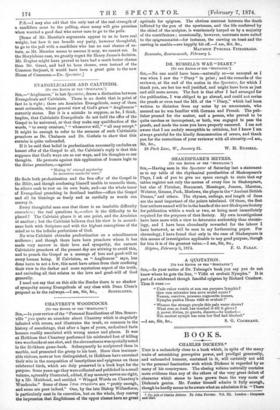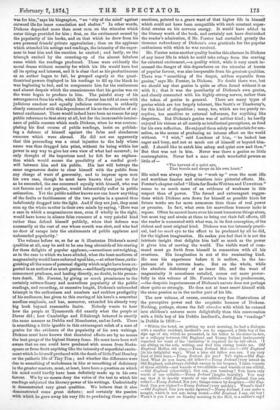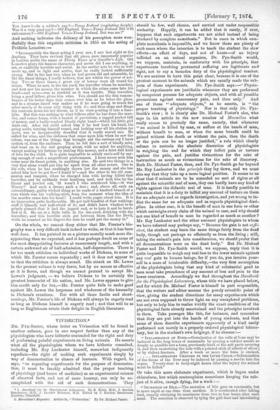BOOKS.
CHARLES DICKENS.* Tnis is a melancholy close to a book which, in spite of the many traits of astonishing perceptive power, and prodigal generosity, and unbounded humour, contained in it, will certainly not add to the personal fascination with which Dickens is regarded by so many of his countrymen. The closing volume naturally contains more evidence than any of the others of the very great defect of character which seems to have grown from the very roots of Dickens's genius. Mr. Forster himself admits it fully enough, though he hardly seems to be aware what an admission it is. "There
• The Life of Charles Macau. By John Forster. Vol. III. London : Chapman and Hall. was for him," says his biographer, "no 'city of the mind' against outward ills for inner consolation and shelter." In other words, Dickens depended more than most men on the stimulus which outer things provided for him ; first, on the excitement caused by the popularity of his books, and on that which he drew from his -own personal friends' private appreciation ; then on the applause which attended his actings and readings, the intensity of the eager- ness to hear him and the emotion he excited ; and lastly, on the triumph excited by the counting-up of the almost fabulous sums which the readings produced. These were evidently the moral drams without security for which his life would have lost all its spring and interest, and it is clear that as his productiveness as an author began to fail, he grasped eagerly at the quasi- theatrical powers displayed in his readings to fill up the blank he was beginning to feel, and to compensate him for the restlessness and almost despair which the consciousness that his genius was on -the wane began to produce in him. The painful story of his estrangement from his wife, which Mr. Forster has told at once with judicious candour and equally judicious reticence, is evidently closely connected with this dependence of his on the stimulus of ex- ternal excitement. There would indeed have been no reason for any public reference to that story at all, but for the inexcusable intoler- ance of public censure which made Dickens, when he was contem- plating his first course of public readings, insist on publish- ing a defence of himself against the false and slanderous rumours which were abroad. He did not see apparently that this proceeding was a cruel injustice to the lady whose name was thus dragged into print, without its being within her power in any way to give her own view of what had occurred ; be -only thought of the imperious need he felt for an explana- tion which would secure the possibility of a cordial good- will between him and his public. His last will betrays the same ungenerous desire to clear himself with the public from any charge of want of generosity, and to impress upon men his own case, though he must have known that just so far as he succeeded, the one concerned equally with himself, who was not famous and not popular, would inferentially suffer in public estimation. Yet the public neither knows nor can know anything uf the faults or faultlessness of the two parties in a quarrel thus indelicately dragged into the light. And if they are just, they must sum up the whole matter in their own minds by saying, 'Here was -a case in which a magnanimous man, even if wholly in the right, would have borne in silence false rumours of a very painful kind -rather than defend himself publicly, when that defence was necessarily at the cost of one whose mouth was shut, and who had no door of escape into the excitements of public applause and unbounded popularity.'
The volume before us, so far as it illustrates Dickens's moral qualities at all, may be said to be one long chronicle of his craving for these delights of popular applause,—sometimes outweighing, as in the cage to which we have alluded, what the least modicum of -magnanimity would have enforced upoll him, —at other times, extin- guishing all the sense of personal dignity which might have been ex- pected in an author of so much genius,—andfinallyoverpowering the -commonest prudence, and leading directly, no doubt, to his prema- ture death. Mr. Forster, by giving so much prominence to the uertainly extraordinary and marvellous popularity of the public readings, and recording, at excessive length, Dickens's unbounded triumph in the enthusiasm and numbers and reckless prodigality -of his audiences, has given to this craving of his hero's a somewhat needless emphasis, and has, moreover, extended his already very
big book beyond reasonable limits. Nobody wants to hear how the people at Tynemouth did exactly what the people at Dover did ; how Cambridge and Edinburgh behaved in exactly the same manner as Dublin and Manchester, and so forth. There is something a little ignoble in this extravagant relish of a man of -genius for the evidence of the popularity of his own writings. Dickens must have known that theatrical effects are by no means the best gauge of the highest literary fame. He must have been well -aware that no one could have produced with scenes from Shake- speare or from Scott anything like the intensity of superficial excite- ment which he himself produced with the death of little Paul Dombey or the pathetic life of Tiny Tim ; and whether the difference were due to something of melodrama in him or something of deficiency in the greater masters, must, at least, have been a question on which his mind could hardly have been definitely made up in his own favour. We by no means deny the value of the test to which his readings subjected the literary power of his writings. Undoubtedly it demonstrated very great qualities. We believe that it also demonstrated some great defects ; and certainly the passion with which he gave away his very life to producing these popular emotions, pointed to a grave want of that higher life in himself
which could not have been compatible with such constant super- ficial strains on his nervous energy. It would have added to the literary worth of the book, and certainly not have diminished the reader's admiration, if Mr. Forster had curtailed greatly the tiresome redundancy of Dickens's own gratitude for the popular enthusiasm with which he was received.
Mr. Forster notes another quality besides this absence in Dickens of any inner life in which he could take refuge from the craving for external excitement,—a quality which, while it very much in- creased the danger of this dependence on the stimulus of bursts of popular favour, was also inseparable from his greatest qualities.
There was "something of the despot, seldom separable from genius," says Mr. Forster, in Dickens. No doubt there was, but we should say that genius is quite as often found without it as with it ; that it was the peculiarity of Dickens's own genius, and closely connected with his highly-strung nerves, rather than
the token of genius in general. There are many types of genius which are too largely tolerant, like Scott's or Thackeray's, for this kind of disposition ; many, too, which are too purely re- ceptive, too sensitive to external influences, for anything like despotism. But Dickens's genius was of neither kind ; he hardly enjoyed his visions at all merely as intellectual perceptions, as food for his own reflection. He enjoyed them solely as materials for sen-
sation, as the means of producing an intense effect on the world without. "I wish," said Landseer of him, 'She looked less eager and busy, and not so much out of himself or beyond him- self. I should like to catch him asleep and quiet now and then." But that was not in him. Never was there a genius so little contemplative. Never had a man of such wonderful powers so little of —
" The harvest of a quiet eye, That broods and sleeps on his own heart."
His mind was always trying to "work up" even the most idle and worthless fancies and situations into pictorial effects. Mr. Forster's chapter called "Hints for Books Written and Unwritten" seems to us much more of an evidence of weakness in this respect than of power. The forced and extravagant sugges- tions which Dickens sets down for himself as possible hints for future works are far more numerous than those of real power or promise. In fact, what even his marvellous humour lacks is repose. Often he cannot leave even his most humorous things alone, but must tug and strain at them to bring out their full effects, till
the reader is nauseated with what was, in its first conception, of the richest and most original kind. Dickens was too intensely practi- cal, had too much eye to the effect to be produced by all he did,
for the highest imagination. He makes you feel that it is not the intrinsic insight that delights him half so much as the power it gives him of moving the world. The visible word of com- mand must go forth from himself in connection with all his creations. His imagination is not of the ruminating kind. He uses his experience before it is mellow, in the im- patience of his nervous haste. But on the whole, while the absolute deficiency of an inner life, and the want of magnanimity it sometimes entailed, comes out more power- fully in this volume of Mr. Forster's than in its predecessors, —the despotic imperiousness of Dickens's nature does not perhaps show quite so strongly. He does not at least assert himself with the same passion as in the earlier part of his life.
The new volume, of course, contains very fine illustrations of the perceptive power and the exquisite humour of Dickens. Nothing, perhaps, shows the full abandon with which he entered into children's natures more delightfully than this conversation with a little boy of his Dublin landlord's, during his "readings" in Dublin in 1858:— " Within the hotel, on getting up next morning, he had a dialogue with a smaller resident, landlord's son he supposed, a little boy of the ripe age of six, which he presented, in his letter to his sister-in-law, as a colloquy between Old England and Young Ireland inadequately reported for want of the 'imitation' it required for its full effect. 'I am sitting on the sofa, writing, and find him sitting beside me. Old England. Halloo, old chap.—Young Ireland. Hal—loo !—Old England (in his delightful way). What a nice old fellow you are. I am very fond of little boys.—Young Ireland. Air yes ? Ye'r right.—Old Eng- land. What do you learn, old follow?—Young Ireland (very intent on Old England, andalways childish except in his brogue). I lairn wureds of three sillibils—and wureds of two sillibils—and wureds of one sillibil.
— Old England. (cheerfully). Got out, you humbug You learn only words of one syllable.—Young Ireland (laughs heartily). You may say that it is mostly wureds of one sillibil.—Old England. Can you write ?— Young Ireland. Not yet; things comes by deograys.—Old Eng- land. Can you ciphor?—Young Ireland (very quickly). Whaat's that? — Old England. Can you make figures ?—Young Ireland. I can make a nought, which is not asy, being roond.—Old England I say, old boy! Wasn't it you I saw on Sunday morning in the Hall, in a soldier's cap? You know !—In a soldier's cap ?—Young Ireland (cogitating deeply). Was it a very good cap?— Old England. Yes.—Young Ireland. Did it fit ankommon ?—Old England. Yes.—Young Ireland. Dat was me !"
And nothing indicates the delicacy of his perception more won- derfully than this exquisite criticism in 1855 on the acting of Faderic Lemaltre
"Incomparably the finest acting I ever saw, I saw last night at the Ambign. They have revived that old piece, once immensely popular in London under the name of Thirty Years of a Gambler's Life. Old Lemattre plays his famous character, and never did I see anything, in art, so exaltedly horrible and awful. In the earlier acts he was so well made up, and so light and active, that he really looked sufficiently young. But in the last two, when he had grown old and miserable, he did the finest things, I really believe, that are within the power of act- ing. Two or three times, a great cry of horror went all round the Louse. When he met, in the inn yard, the traveller whom he murders, and first saw his money, the manner in which the crime came into his head—and eyes—was as truthful as it was terrific. This traveller, being a good fellow, gives him wine. You should see the dim remem- brance of his bettor days that comes over him as he takes the glass, and in a strange dazed way makes as if he were going to touch the other man's, or do some airy thing with it ; and then stops and flings the contents down his hot throat, as if he were pouring it into a lime- kiln. But this was nothing to what follows after he has done the mur- der, and comes home, with a basket of provisions, a ragged pocket full of money, and a badly-washed bloody right hand—which his little girl finds out. After the child asked him if he had hurt his hand, his going aside, turning himself round, and looking over all his clothes for spots, was so inexpressibly dreadful that it really scared one. He called for wine, and the sickness that came upon him when he saw the colour, was one of the things that brought out the curious cry I have spoken of, from the audience. Then he fell into a sort of bloody mist, and went on to the end groping about, with no mind for anything, except making his fortune by staking this money, and a faint dull kind of love for the child. It is quite impossible to satisfy one's-self by say- ing enough of such a magnificent performance. I have never seen him come near its finest points, in anything else. He said two things in a way that alone would put him far apart from all other actors. One to his wife, when he has exultingly shown her the money and she has asked him how he got it—‘I found it'—and the other to his old com- panion and tempter, when he charged him with having killed that traveller, and he suddenly wont headlong mad, and took him by the throat and howled out, 'It wasn't I who murdered him,—it was 3lisery !' And such a dress; such a face ; and, above all, such an exlraordinary, guilty wicked thing as he made of a knotted branch of a tree which was his walking-stick, from the moment when the idea of the murder came into his head I could write pages about him. It is an impression quite ineffaceable. He got half-boastful of that walking- staff to himself, and half-afraid of it; and didn't know whether to be grimly pleased that it had the jagged end, or to hate it and be horri- fied at it. Ho sat at a little table in the inn-yard, drinking with the traveller; and this horrible stick got between them like the Devil, while he counted on his fingers the uses he could put the money to."
On the whole, we cannot deny either that Mr. Forster's bio- graphy was a very difficult book indeed to write, or that it has been well done. It has painted to us a picture morally much more dis- appointing than we expected, and it has perhaps dwelt on some of the most disappointing features at unnecessary length, and with a certain awkward air of half-admission, half-deprecation. There is far too much criticism on individual works of Dickens, to some of which Mr. Forster recurs repeatedly ; and it does not appear to us that the criticism is always sound. His attack on Mr. Lewes in the present volume is very fierce, but by no means as effective as it is fierce, and though we cannot pretend to accept Mr. Lewes's judgment, — we believe Dickens to be certainly the greatest humourist of his nation, and Mr. Lewes appears to give him credit only for fun,—Mr. Forster quite fails to make good against Mr. Lewes the largeness and wholeness of the humanity in Dickens's creations. But with all these faults and short- comings, Mr. Forster's life of Dickens will always be eagerly read as long as Dickens himself is eagerly read ; and that will be as long as Englishmen retain their delight in English literature.




































 Previous page
Previous page